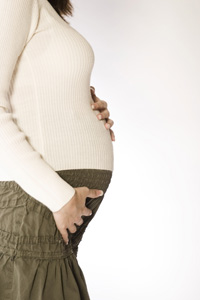PREGNANCY
PREGNANCY - EXPECTING A BUNDLE OF JOY

Sources – B, Srilakshmi, Dietetics
NUTRITIONAL REQUIREMENTS DURING PREGNANCY
Increase in nutritional requirements depends on the nature of metabolic changes of pregnancy and the nutrition reserves of the mother. Fine-tune your diet - even if you already eat well, now that you're a mum-to-be, you need to fine tune your eating habits to ensure that you have a balanced and healthy diet.
GENERAL DIETARY PROBLEMS
NAUSEA AND VOMITING:
 Morning sickness can be improved by small and frequent meals.
Morning sickness can be improved by small and frequent meals.
 Liquids may be taken between meals instead of with food.
Liquids may be taken between meals instead of with food.
 Skim milk is better tolerated than whole milk.
Skim milk is better tolerated than whole milk.
 Fatty rich foods, excessive seasoning, coffee in large amounts and strongly flavored
vegetables may be restricted or eliminated if the nausea persists or if complaints of heartburn or gastric distress.
Fatty rich foods, excessive seasoning, coffee in large amounts and strongly flavored
vegetables may be restricted or eliminated if the nausea persists or if complaints of heartburn or gastric distress.
CONSTIPATION:
 The pressure of enlarging uterus on the lower portion of intestine, physical inactivity may make elimination difficult. Increased fluid intake and use of natural laxative foods such as whole grains, dried , vegetables rich in fiber, , and fresh juices usually induce regularity.
The pressure of enlarging uterus on the lower portion of intestine, physical inactivity may make elimination difficult. Increased fluid intake and use of natural laxative foods such as whole grains, dried , vegetables rich in fiber, , and fresh juices usually induce regularity.
OEDEMA AND LEG CRAMPS:
 Mild, physiologic edema is usually present in the extremities in 3rd trimester i.e. 6-9months. The swelling may be caused by pressure of enlarging uterus.
Mild, physiologic edema is usually present in the extremities in 3rd trimester i.e. 6-9months. The swelling may be caused by pressure of enlarging uterus.
 Decrease in sodium rich foods/ salt and increase in magnesium helps to relieve the leg cramps.
Decrease in sodium rich foods/ salt and increase in magnesium helps to relieve the leg cramps.
HEARTBURN:
 Heart burn is a common complaint during the latter part of pregnancy.
Heart burn is a common complaint during the latter part of pregnancy.
 This can usually be relieved by limiting the amount of food consumed at one time and drinking fluids between meals.
This can usually be relieved by limiting the amount of food consumed at one time and drinking fluids between meals.
 Sitting upright after meals for at least 2-3 hours before lying down may also help.
Sitting upright after meals for at least 2-3 hours before lying down may also help.
DIETARY GUIDELINES:
 Small frequent meals should be taken.
Small frequent meals should be taken.
 Avoid fasting and feasting.
Avoid fasting and feasting.
 More fiber should be included in the diet to prevent constipation which is common during pregnancy ( and vegetables).
More fiber should be included in the diet to prevent constipation which is common during pregnancy ( and vegetables).
 Diet should be rich in calcium to prevent osteomalacia. Calcium supplements may also be taken.
Diet should be rich in calcium to prevent osteomalacia. Calcium supplements may also be taken.
 Iron rich foods should be taken to prevent anemia and build up iron stores in fetal body. Iron supplements are must.
Iron rich foods should be taken to prevent anemia and build up iron stores in fetal body. Iron supplements are must.
 Inclusion of green leafy vegetables ensures minerals like calcium and iron.
Inclusion of green leafy vegetables ensures minerals like calcium and iron.
 Plenty of water should be taken to keep the bowels regular.
Plenty of water should be taken to keep the bowels regular.
 Fatty foods, fried foods, excessive seasoning, strongly flavored vegetables to be restricted in case of nausea, gastric distress.
Fatty foods, fried foods, excessive seasoning, strongly flavored vegetables to be restricted in case of nausea, gastric distress.
 Fluid should be taken between meals rather than along with the meals.
Fluid should be taken between meals rather than along with the meals.
 Adequate amount of calories should be taken so that enough fat is deposited during pregnancy which is required for lactation.
Adequate amount of calories should be taken so that enough fat is deposited during pregnancy which is required for lactation.
 Use pickles, rasam, sour foods to give relief from nausea.
Use pickles, rasam, sour foods to give relief from nausea.
 Consume Omelet, boiled egg, and scrambled egg to give good quality proteins.
Consume Omelet, boiled egg, and scrambled egg to give good quality proteins.
 Consume and salads as they are appetizing, provide nutrients and also high in fiber.
Consume and salads as they are appetizing, provide nutrients and also high in fiber.
